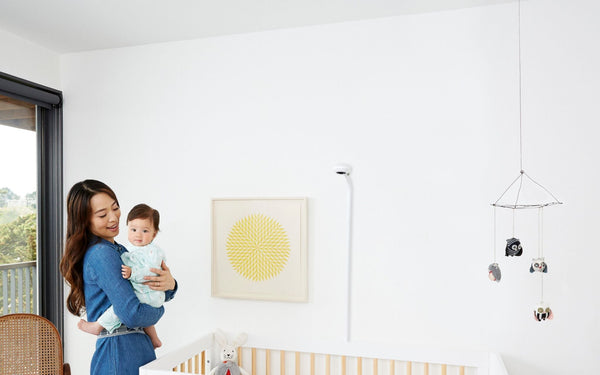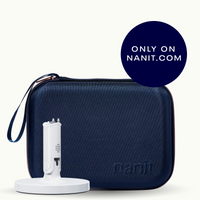Preparing for a permanent resident in your life that you’ve never met can be tricky, but doing nothing to prepare is even trickier. While there is no way to ensure you won’t be popped with surprises during early motherhood, there are ways to set yourself up for greater success, satisfaction, and sanity before your wiggly little person makes their grand entrance.
To kick off your preparations, complete the following to-dos before The Day:
1. Create Your Baby Zones.
Babies have a sneaky way of taking over every square inch of your house if you don’t designate specific areas wholly devoted to your noisy cherub. For example, set up a changing zone in one room of your house (or two if your home is spread out) and an always stocked and organized diaper bag you can grab for on-the-go changes (like blowouts so messy it’s best to bring the supplies to baby.) In addition, consider setting up play zones, feeding zones, sleep zones, dressing zones, and any other zones you think your baby will need.
While tiny socks and colorful chunks of plastic will still find their way into non-baby zones, you’ll be better equipped to maintain a semblance of control over the state of your with-child home.
2. Organize Your Must Have Supplies.
Now that you’ve decided what zones you want to set up, and where they’ll be, you can start stocking these areas with supplies.
Keep your zones and life simple by only inviting in items you’re fairly certain you’ll use. A few supplies many moms find essential in their homes are a baby monitor, clothing ranging in size from 3-6 months, burp cloths, diapers, wipes, changing pads, a first aid and hygiene kit, night-light, and baby carrier. Every mom will have a slightly different list of essential supplies – to craft yours think through the various elements of your life and how they will relate to life with a baby, jotting down items you believe will make each area of your life easier.
3. Choose a Pediatrician.
If your baby wakes up in the middle of the night with a high fever, or you just think they’re making weird sounds in their sleep, it’s nice having a pediatrician you trust to call up. Start collecting a list of pediatricians to interview by getting recommendations from other parents in your area, or mom groups you resonate with, then do online research on each recommendation. Next, make an appointment with your favorites to see if you have a match. Finally, lock in your fave.
4. Line Up Your Support Team.
You’ll not only need help but will deserve help after your baby is born. Don’t wait for your hands and mind to be mega-full before you organize postpartum support.
Think about your friends and family who live near you, or might be willing to stay with you after baby is born, that you can ask for specific types of help. Reach out to these special people, ask for their help, and if they’re willing set up specific days and time periods they’ll support you each week during the first three months of baby’s life.
You can ask certain people to help you with cleaning, others with cooking, some with baby care, and you may just want a few people who will come over on a regular basis to talk. While it can be hard to ask for this help the eventual payoff is so worth it for you and baby.
5. Read About the Fourth Trimester.
Find a book (like Feng Shui Mommy!) that covers what you can expect in the first three months of baby’s life – the “fourth trimester.” Helpful topics include postpartum symptoms, baby care questions, breastfeeding support (if you’re choosing to breastfeed), and techniques for bonding. Although every mother-baby pair will have a different experience, a few layers of anxiety can be wiped away by filling yourself with basic and non-threatening information. Extra points if you can find reading material that’s both informative and humorous – laughing helps to strengthen those abs!
6. Make Your List of Your “Must Dos”, “Ask For Helps”, and “Let Gos.”
Because having a baby turns your priorities on their heads, premeditate these shifts in priorities (as much as possible) and organize your life accordingly.
To do this, first make a list of activities you absolutely cannot live without, for example, showering and exercising – these will be the nonnegotiables you make sure you get to almost every day. Next, make a list of tasks you’ll need completed but want to delegate, for example, cooking and cleaning – figure out who will tackle these tasks before baby arrives. Last, make a list of the tasks and priorities you can temporarily set aside as you adjust to your new life, for example, having done up hair and makeup, or engaging in an hour long call with your best friend every week – you’ll be pleased to discover that by your baby’s first birthday most of these activities will already be back in your life. While these lists are flexible and might need to be shifted as you navigate your new reality, you’ll be much more set up for a healthy and happy period of adjustment.
7. Practice Your Go-To Relaxation Tools.
A big secret of motherhood is that it can be really stressful – no one ever talks about it. Wink wink. But really, you need tools to soothe those stressor hormones when you’re operating on less than four hours of sleep, are covered in spit-up, and can’t remember the last time your newborn wasn’t crying. Practice “quickie” relaxation techniques like deep breathing, affirmations, a few jumping jacks, or meditation moments (meditating on a beautiful flower, the softness of your baby’s skin, or anything other pleasure-inducing thing or thought for a few moments) and see what is most effective for calming your nerves. Then, when baby has you up at 4am and you stub your toe while walking to the changing table, you know to immediately take three deep breathing and do 15 jumping jacks. You got this.








































